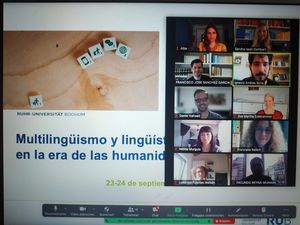- You are here:
- Startseite
- Doctoral Researchers
- Funding for Internationalization
- Project International Event
- Funded International Events
- Multilingualism and migration linguistics
Multilingualism and migration linguistics in the era of digitalization
22 September -24 September 2021
The conference aim the goal of exploring the added value and boundaries of digitalization in the field of migration linguistics and multilingualism research. For this, the Spanish-speaking world was brought to the fore in theoretical and empirical terms.
The one-day workshop Narratives and Exile facilitated by Adriana Patiño Santos (Southampton) preluded the scope of the conference in a hands-on format. In the opening lecture, Eva Eckkrammer (Mannheim) suggested that basic conceptual instruments should be rethought with the help of neighboring linguistic disciplines. For instance, this concerns the category of origin, which itself includes the concept of community, extremely valuable for sociolinguistics
Olga Kellert (Göttingen) presented some possibilities and limitations of geolocalization on Twitter to investigate linguistic features in their spatial manifestation. This way, she identified linguistic traces of historical migration in Latin American tweets and its spread, such as the Italianism laburo “work”.
Franziska Kailich (Würzburg) traced the neologism covidiota on tweets that emerged from March 2020 and analyzed its usage at different points in time This way, she succeeded in elaborating a semantic-pragmatic usage profile.
Gabriela Prego (Santiago de Compostela) focused on how young Moroccan people in Galicia communicate on social media. Her multilingual repertoire is characterized by a mixture of Spanish, Galician, French, Darija and the chat language Arabizi.
Facundo Reyna Munian (Bremen/Kiel) presented digital communities of the Galician diaspora in Argentina, the so-called e-Galeguidade. He demonstrated the role of the Galician language in the digital construction of Galician identity in diasporic situations by examining some of the most used websites, like Fillos de Galicia.
Nélida Murguía (Buenos Aires) presented the project Damay Jaangë Español project and, in consequence, she established a link between linguistics and didactics. The aforementioned project is an initiative that sets up language courses for Senegalese migrants in Buenos Aires, digitally adapted.
Alba Polo Artal (Zaragoza) investigated on spanish extreme-right discourse. She found out that representations of masculinity/ies play a key role in the party's construction of hate speech on its tweets. Thus, VOX constructs an image of a patriarchal, national-catholic, and protective masculinity.
Francisco José Sánchez García (Granada), who examined exemplary hate speech posts by young people about migrants on social media, addressed the question of how such discourses can be counteracted. He suggests discussing and educating people on hate speech at school as a solution.
Maria Sabaté Dalmau (Lleida) presented the influence of commercial language regulations of the main telecommunication companies in Catalonia and Spain. Grounded on an analysis of linguistic practices of migrants who regularly visit a call center, her work provided us with examples of language commodification.
Little is known about Latinxs in London. Using a sociolinguistic and ethnographic approach, Adriana Patiño Santos (Southampton) examined the way in which a collective identity is constructed thorugh diaspora radios.
Manuel Zaniboni (Verona) put reggaeton at the center of his contribution. After a historical location, he analyzed its phonetic, morphological, syntactic and lexicological features.
Furthermore, exchange was enabled at a joint conference breakfast. Congratulations to Alba Polo Artal, whose scientific poster was awarded with a book prize and a certificate.
We would like to express our sincere gratitude to Prof. Dr. Laura Morgenthaler García and the RUB Research School for their diverse and generous support.
This conference was organized by Ignacio Andrés Soria. He was supported by Dr Sandra Issel-Dombert. If you have any questions about the conference, they will be happy to hear from you via e-mail.



